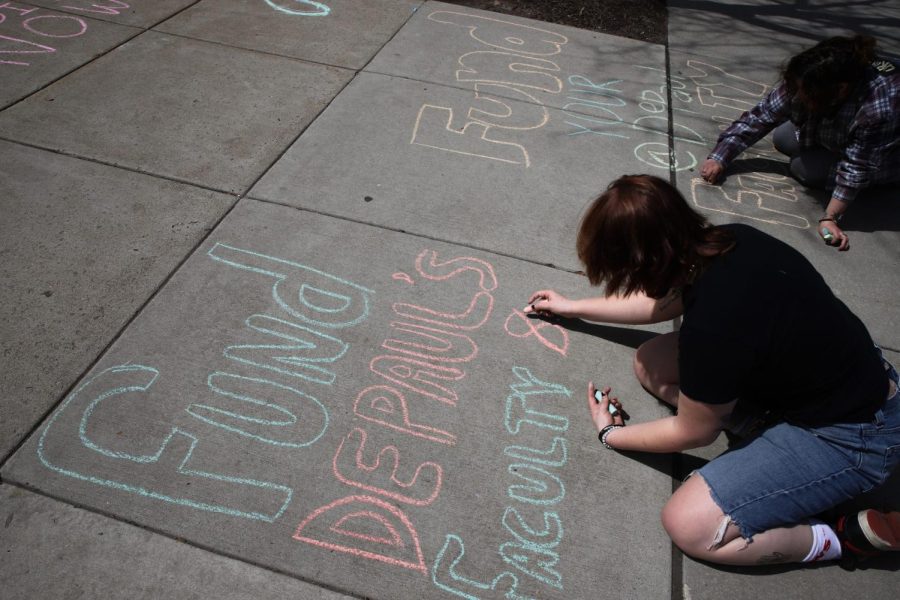The DePaulia staff is committed to providing the paper’s readers with information they need to know, while trusting the readership to reach its own conclusions on the basis of that information.
This past week, DePaul University’s budget crisis, faculty and staff cuts and student organizing have been the talk of Chicago, reaching even alumni like me.
I have previously voiced here in The DePaulia my belief that the university’s ongoing crises stem from a lack of foresight to properly invest in faculty, staff and resources, particularly for marginalized students, a path that would improve the overall quality of the university.
However, I believe the sudden emergence this past week of grassroots student organizing efforts to combat the announced budget cuts, circumventing established channels of administration-student interaction, brings attention to deeper, more troubling questions about the overall efficacy and relevancy of student government at DePaul.
As enshrined in its own constitution, the DePaul Student Government Association (SGA) serves “as an official voice for…the student body,” entitling it to seats on vital co-governance committees such as the Strategic Resource Allocation Committee (SRAC) and the Tuition Pricing Committee (TPC), which ultimately dictate the university’s budget. Co-governance comprises the main governing bodies at DePaul, Faculty and Staff Councils, SGA, Joint Council, bodies established to allow various stakeholders to contribute to DePaul’s administration. Participation in these co-governance committees grants SGA the information and power that in theory empower it to directly address the two primary demands of Monday’s organizers: accountability and an independent audit of the budget.
Why, then, was SGA largely absent on Monday from the protest and from the meetings between student organizers and administration? Why did students turn to these newcomer grassroots organizers instead of turning to their “official” voice at SGA?
The answer is clear to me: SGA has become all but useless in this kind of advocacy. While it may be the official channel for students to direct their voices to the university administration, SGA has lost its own transparency, substance and direction. SGA’s response to the budget crisis illustrates these deficiencies, and moreover reflects the growing disconnect between SGA and students and faculty.
SGA President Kevin Holechko patronizingly dismissed the forthcoming cuts to jobs as simply an issue of communication, simply the result of faculty and staff lacking proper understanding of the budgeting process, and insisting that the loss of faculty, certificates and programs will not disrupt students’ academic experience because it is planned to be phased over two years.
Frankly, Holechko’s assertions are both insulting and patently false.
Despite everything the university administration has done to try to keep faculty from organizing such as encouraging faculty not to unionize in favor of keeping a “direct working relationship”, faculty and staff have kept themselves well informed of pending budget cuts and the threat these cuts pose to their jobs. They know about their seat on SRAC, they know how the budget is made and for some, sadly, they know they will be seeking a new job for next fall.
Similarly, phasing budget cuts over two years is nothing but a flaccid attempt by the administration to soften the blow. How could the loss of one’s certificate program or the departure of beloved faculty members not impact students’ academic experiences, let alone faculty members’ whole lives?
SGA’s sad decline into nothing more than a mouthpiece of the university administration has also previously been highlighted by its past failure to meaningfully address other pressing issues on campus. SGA was largely absent from the struggle of DePaul’s dining workers, leading grassroots student organizers to instead take charge, much like at Monday’s protest.
It was through these students, through the workers themselves, and through those workers’ union, UNITE HERE Local 1—not through SGA—that a new contract was won. SGA was nowhere to be found, sitting on its hands while its members collected their scholarships for their so-called service at SGA.
This has unfortunately become par for the course for SGA, with voter turnout to its barely contested elections declining 40% year-over-year from 2021 to 2022, a resounding rebuke of SGA’s stunning lack of relevancy. What even is the point of SGA anymore? This question reverberates even more loudly after Monday’s hastily organized protest earned grassroots student organizers a meeting with key administrators despite a lack of any formal SGA titles to open those doors for them.
What is the place for an organization like SGA, meant to serve as the representatives for students, when administrators choose to meet instead with grassroots student organizers? SGA has the privilege of access, a seat at the table and institutional knowledge, so why does it decide against zealously advocating for students and their academic experience? What claim does this kind of organization have to serve as the official voice of students when its declining voter turnout has reached the depths of less than 2% of the student body?
As a former member of DePaul’s SGA, I assure you that SGA has long lost its claim to any of these. Still, while students may have been abandoned by their “official” voice at SGA, Monday’s protest reminded us all of the strength, resiliency and solidarity of DePaul’s student body.
I doubt we will soon forget the power the student body has when it comes together like this.
Wesley Janicki (‘22) was the SGA Executive Vice President of Operations from 2020 to 2021.



